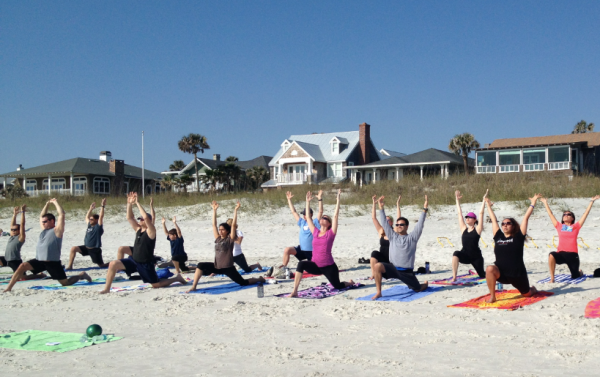The sun is finally out and the weather has been amazing the past few days! I encourage all of you to get outside, be active, and enjoy the warm sun, as we welcome the spring season. It has been a chilly winter for most of the country, now with spring in our sights, I wanted to touch on a subject that I feel is often misunderstood….Vitamin D from sun exposure, and how it impacts your health, fitness level and overall wellbeing.

Many people today have heard so much about the negatives of too much exposure to the sun that they avoid it at all costs. (Not an easy task if you live in Florida – The Sunshine State!) However, completely avoiding the sun can actually be detrimental to your health and fitness.r Exposure to the sun is one of the major sources of vitamin D, and if you want muscle and cardiovascular strength you need to make sure you get proper amounts.
Benefits of Vitamin D
Vitamin D helps the body absorb calcium, a main building block of bone, and contributes to the maintenance of strong bones. Without vitamin D, the body absorbs only about 10-15% of dietary calcium, and 60% of phosphorus. Calcium and phosphorus are directly related to bone mineral density, and a lack of it can cause osteoporosis and fractures. Vitamin D also carries messages between the brain and every body part to help muscles move, and is required by the immune system to fight off bacteria and vitamins. In addition, vitamin D is thought to provide a variety of health benefits, such as:
- Aid the immune system – to ward off the common cold and other illnesses
- May reduce the risk of developing multiple sclerosis
- Help maintain cognitive functions
- Help maintain a healthy body weight
- Reduce the severity and frequency of asthma symptoms
- Reduce the risk of developing rheumatoid arthritis in women
- Protect against damage from low levels of radiation
- Lower the risk of developing cancer
- Increase the recovery rate of tuberculosis
- Help reduce the risk of heart attack
Causes of Vitamin D Deficiency
During your annual exam, ask your healthcare provider to include vitamin D as part of your blood test. This will help you identify whether or not you have a vitamin D deficiency. Other than a lack of exposure to sunlight, there are several reasons you may be deficient.
- You don’t consume the recommended levels of vitamin D over time. (Especially common for vegans who omit fish, eggs, cheese, and milk)
- You have limited sunlight exposure, either naturally based on your weather climate, or as a result of your clothing or occupation.
- You have dark skin. The pigment melanin reduces the skin’s ability to make vitamin D.
- Your kidneys cannot convert vitamin D to its active form.
- Your digestive tract cannot adequately absorb vitamin D as a result of Crohn’s disease, cystic fibrosis, or celiac disease.
- You are obese. People who have a BMI of 30+ generally have low levels of vitamin D due to the fact that fat cells extract it from the blood and it is not properly circulated through the body.
Sun Exposure for Vitamin D Consumption
It’s a common misconception that you can walk outside anywhere and any time of day, and receive adequate amounts of vitamin D strictly from sun exposure. In actuality, in-order to attain good vitamin D exposure and consumption, the sun must be positioned perpendicular to the Earth in-order for your body to absorb the for the vitamin D-rich UVB rays. This roughly translates to midday sun exposure during Spring, Summer and Fall in Florida. Winter months are difficult for vitamin everywhere in the US and Europe
According to the Vitamin D Council, you only need to expose your skin to the sun for about half the time it takes for your skin to turn pink. Therefore, the amount of time you should spend in the sun depends on the time of day, where you live, and the color of your skin.
Other sources include supplements, and some foods. While you cannot get the required amount of vitamin D from food alone, you can benefit from foods that contain it naturally such as salmon, mackerel, herring, and cod liver oil. Some foods such as milk, select juices, breads, yogurts, and cheeses are fortified with vitamin D.
D + You = Healthy Body
While the body makes vitamin D, using the sun and vitamin D rich foods to kickstart the process, some people may have health issues that counteract production. With that in mind, make sure you know your vitamin D levels, and find a way to ensure you get the amount you need through sunlight, foods and supplements, if needed. Your bones, immune system, and neuromuscular system will definitely benefit.
Recommended Amounts of Vitamin D Supplements
The Food and Nutrition Board recommends varying amounts of vitamin D based on age. Vitamin D3 is best.
| Age | Recommended Amount |
|---|---|
| Age | Recommended Amount |
| Birth to 1 Year | 400IU |
| 1 - 70 Years | 600IU |
| 71+ | 800IU |
| Pregnant & Breastfeeding Women | 600IU |
Stay tuned in the coming days/weeks…with the warmer weather I am going to be starting my Beach Bootcamps again this spring!
